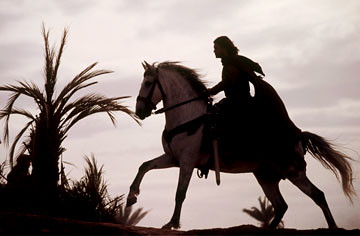Kingdom of Heaven: fighting reality with idealism
On Sunday afternoon I went to see a matinee of the new Ridley Scott film starring Orlando Bloom, Kingdom of Heaven.
Having seen trailers for the film, for many months leading up to its release, I went to the film more out of curiosity than excitement. My memory of the historical specifics of the Crusades have faded since I was a young school girl and I was interested to see how the screenwriter, William Monahan and director Ridley Scott presented a story set in this time period that was both compelling and relevant. Judging from the trailers alone it seemed like a repeat of Gladiator, with slightly heavier costuming.
Intriguingly, Kingdom of Heaven was not what I expected. The film centered on the character of Balian, played by Orlando Bloom, a young English blacksmith who had lost his family in tragedy. After a long absence, Balian’s father, Godfrey, portrayed by Liam Neesen, reappears in his life to pass on a large sum of land in Jerusalem for him to inherit and govern. After some hesitation, Balian follows his father to Jerusalem where the peace between the Christian and Muslim factions of the land is tenuous. When the King of Jersusalem dies, the political power shifts to a radical Christian leader and his party, leading the two groups to war. Balian must then reconcile his own spiritual morality with his loyalty to his people and his holy land.
The film’s thematic ideal of the search for harmony between the Muslim and Christian cultures was very timely and resonant to the current socio-political situation that exists in the Middle East today. It also addressed the danger of individulas with extreme religious fervor who blind themselves to any truth but their own. It would have been very easy for Scott and Monahan to use the current political climate to support a portrayal that belittled or demonized the Muslim characters in the film, but they didn’t. Somehow amidst the bloody battles they were able to convey two peoples, both with radicals in their midst, but with a common love for God and holiness. There are many moments when the dialogue of the characters points out how similar the prayers of these two religions are, or that that true holiness can not be encapsulated by a physical locale, but rather by a place in our own hearts and minds. On this level, I was surprised by the pulse of pacifism, tolerance and peace that ran through the veins of a film that would appear to exonerate violence if it is for glory.
Like all of Ridley Scott’s movies, the visuals and camera work in this film were elegant and well thought out. I definitely recognized influences from the David Lean school of film making, and certain moments on the sandy dunes recalled Lawrence of Arabia. The look of the film stock vacillated between earthy beiges and browns, and cool bleak blues, accenting the mood of a given scene.
Unfortunately, what the film lacked the most was a real driving force in the story, and a quicker pace. The movie had a total running time of two hours and twenty six minutes, but it felt as though it were over three hours long. Now I don’t mind a long movie, but only if it really makes use of each scene and visual to expand on the story and characters of the film. I wish that this movie had replaced some of the dryer scenes of political quandary and logistics, with scenes that better captivated the essence of the characters. For instance, the characters of Nasir, played by Alexander Siddig, and the King, played by Edward Norton (though you wouldn’t recognize him because he had a metal mask on his face in all scenes), were both compelling, yet under developed and minimized. Orlando Bloom really was the reigning lead of the film, and I thought he did a fine job of conveying a man searching for his identity and his faith. I do feel like he could have benefited from some more characters to play off of. His romance with Eva Green’s character Sibylla felt a bit stunted and lost steam half way through the film. Similarly to her character which I thought was introduced fine enough, and started out well, but became diluted and almost washed away by end of the film.
While I liked the way that the film tried to explore deeper issue of finding harmony within diversity, and the meaning of allegiance to one’s beliefs, I thought the film was almost a bit too abstract, and could have benefited from some more concrete story and plot points to move it along, and keep it from getting so draggy and dreary. I am all about the characters having psychological and philosophical goals in a film, but sometimes it helps when there is something more concrete they are looking to attain in the end as well. Bloom/Balian achieves his spiritual goals at the end of the film, but his quest in the realm of the physical remained unclear.
What surprised me most about this film was how for a movie that billed itself to have tremendous battle scenes, able to kick off the summer movie season with a bloody start, it was much more intellectually grounded that anyone might have guessed. If you’re looking for a fun, entertaining, exciting, engaging summer movie that Kingdom of Heaven is not for you. If you’re looking for a meditative, slightly somber, deliberate piece of philosophical and spiritual ideas, Kingdom of Heaven will fulfill this void.





0 Comments:
Post a Comment
<< Home